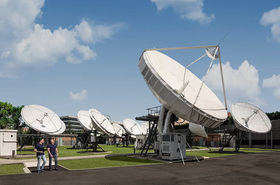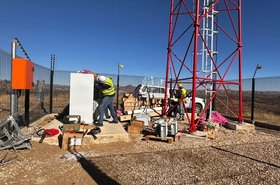Two companies are partnering to create a new satellite-based cloud for data backhaul.
SpaceNews reports Assured Space Access and Phantom Space have partnered to establish Phantom Cloud, a data backhaul service for satellites.
Under the agreement, Assured Space will design and build radio frequency communications payloads for the 66-satellite Phantom Cloud constellation. The partners will also work together to design, develop, launch, and operate the new constellation.
The hope is to create an orbital mesh network that other satellites will access to broadcast their data back to Earth in real-time. In a post to X (formerly Twitter), Phantom said Phantom Cloud seeks to be the 'AWS of Space' by providing machine-to-machine communications and combining this with compute and cloud storage in orbit.
“We want to put the basic functionality of a ground station in space,” Jim Cantrell, Phantom Space co-founder and CEO, told SpaceNews.
“We want to be complementary to what Starlink is doing,” Cantrell said. “We want to focus more on the machine rather than the human-to-human market. That’s a perfect place for a relatively small constellation of satellites.”
Assured Space CEO Sean McDaniel told the publication Phantom Space will be the first customer to adopt its Luneberg Lens-based communication terminals.
Further details weren’t shared.
Phantom Space has raised $27.7 million in funding to date, according to Crunchbase data. In addition to developing satellites, the company is developing multi-payload launch vehicles.
In other recent satellite news:
– Apple is enabling iMessage and SMS messages over satellite in the US in the near future, though full details haven’t been revealed. The company introduced a satellite-based emergency SOS feature last year in partnership with Globalstar.
– Amazon is deorbiting its first two Kuiper prototype satellites, calling the tests a success. The two units were launched last year, ahead of a planned constellation of 3,000.
– Telespazio, the joint venture between Thales and Leonardo, is to integrate SpaceX’s Starlink into its network and services. Telkom Indonesia’s satellite services arm Telkomsat also recently said it would offer Starlink services.
– SpaceNews reports the Defense Department plans to add more than 100 of SpaceX’s Starshield satellites to its future satcom architecture. It aims to acquire them by 2029.
– SpaceX’s Starlink recently conducted its first video call via satellite.
– Omnispace has told the FCC Starlink’s plans for direct-to-cell satellites are creating ‘harmful interference’ that will impact its own satellite constellation.
– AST SpaceMobile has signed a $100 million deal with Verizon. The satellite direct-to-cell firm already has a deal in place with AT&T.
– SES has demonstrated a multi-orbit, multi-band commercial LEO relay, demonstrating relay via Geostationary (GEO) C-band and Medium Earth Orbit (MEO) Ka-band satellites to spacecraft in Low Earth Orbit (LEO).
– SES is to provide services to Uzbekistan via its NSS-12 satellite to local service provider Uz-Sat. SES has also launched in-flight connectivity services.
– Iridium has been awarded a five-year satellite communications contract by the US Space Force.
– Intelsat has won a license to operate in the Philippines.
– Rivada said it has signed a deal with Connecto Network Systems to provide services to the Philippines. Rivada has previously signed a deal with Filippino telco NOW Telecom. It has also recently signed a deal with Brunei service provider Niat, South Korea’s KT Sat, Japan’s AT Communications, and Taiwan’s Teleport Access Services (TAS).
– Yahsat has ordered two communication satellites from Airbus. Al Yah 4 and Al Yah 5, set to launch in 2017 and 2028, will be based on the Airbus Eurostar Neo. They will eventually replace Al Yah 1 and Al Yah 2, which were launched in 2011 and 2012. Yahsat is also partnering with Eutelsat to use capacity on the latter’s Konnect satellite.
– Intelsat is extending its contract to continue using the MEV-2 servicer currently docked with its 10-02 satellite, extending its life by four more years to 2030. MEV-2 has been docked with the 20-year-old 10-02 since 2021.
– Viasat is partnering with Azercosmos to provide services to Azerbaijan.
– Speedcast has inaugurated a new teleport ground station facility for Eutelsat OneWeb in Cali, Colombia.
– Thailand’s state telco National Telecom (NT) is reportedly at risk of losing its partnership with OneWeb over permitting delays. The company is reportedly meeting with Taiwanese telcos to explore placing infrastructure there instead.
– Ground station as a service provider Infostellar has started construction of a new satellite communications gateway at its Taiki Japan ground station. The company is planning to deploy a network of Infostellar-owned antennas across locations including Japan, Singapore, Malaysia, Indonesia, Australia, and New Zealand by the end of next year.
– Astroscale, a company developing mission-extending satellites, has floated on the Tokyo stock market.
– VIAVI Solutions has launched an altGNSS service to deliver timing through L-Band and Ku-Band satellite signals.
– LEOcloud is to install its Space Edge virtualized micro data center on the International Space Station by the end of 2025.
– Indian insurance specialist Tata AIG is entering the space insurance market.
– Telenor Satellite has rebranded as Space Norway.
– Public Investment Fund, the sovereign wealth fund of Saudi Arabia, has launched a new satellite company called Neo Space Group.
– Sateliot is to launch four satellites for its 5G-IoT constellation next month.







